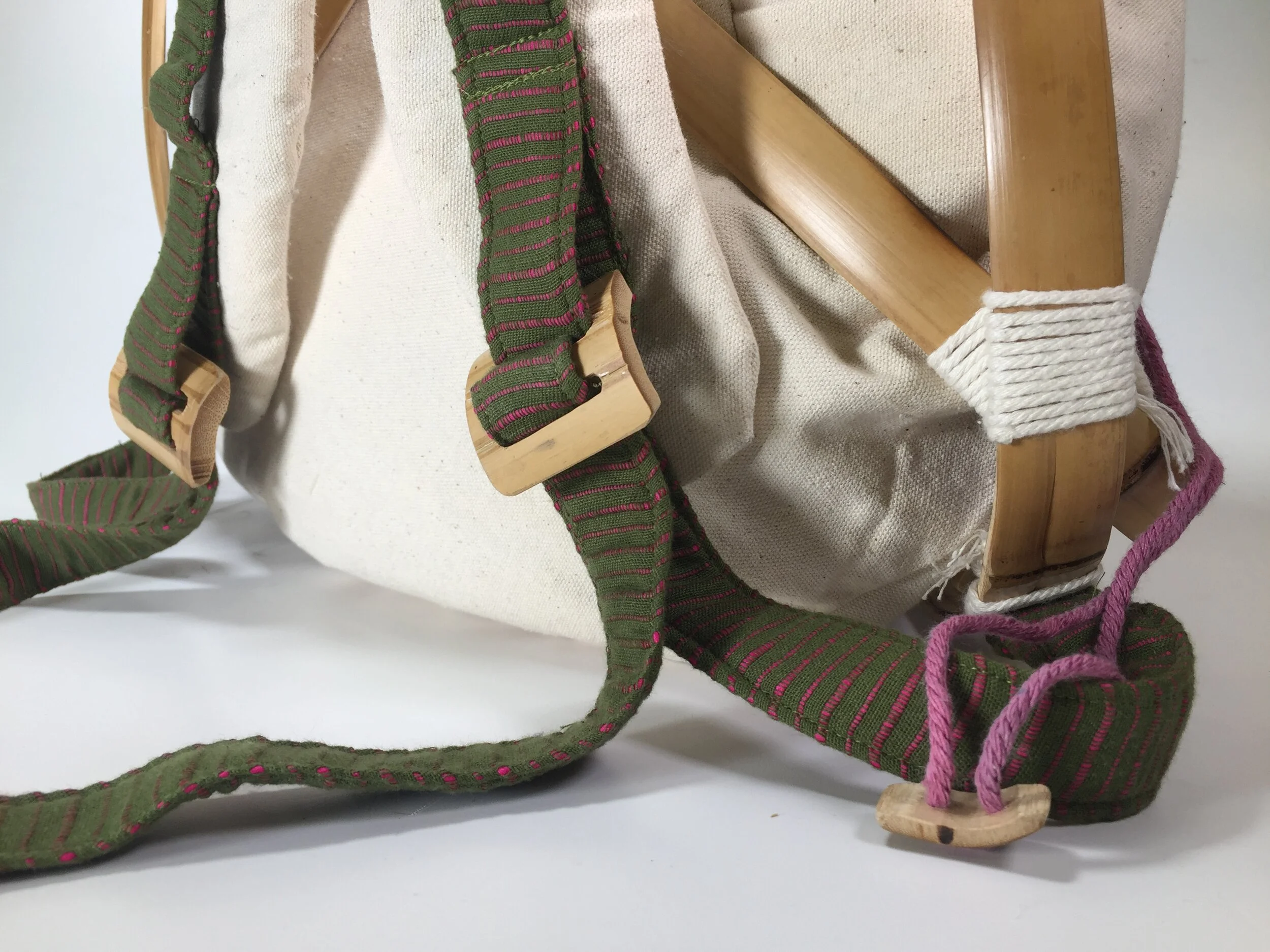Smangus: a backpack honouring aboriginal Taiwanese culture
by Wendy Yun-chia Lo
Smangus in use
Abstract
Today's technology provides a more convenient lifestyle that people can rely on to do many things. However, although technology can help us ive conveniently, it also causes overdependence on it, and this can develop into an unhealthy relationship. Camping is a popular activity that people enjoy to ‘get back to nature’ and escape from the city, but in many ways, existing camping products have failed the core purpose of camping. Although modern camping products make camping easier and more comfortable, they are equipment designed without meaning and without connection to nature.
In Taiwan, camping is a popular activity. There are craftworks created by the Taiwanese aboriginal people using traditional methods and materials, which, if integrated into camping equipment, may create products with the rich meaning associated with Taiwanese aboriginal culture and its connection with nature. This research methodology combines interviews, existing product analysis, prototyping practice in traditional craft, and modern craft design analysis. The data collected demonstrates the potential of integrating the Taiwanese Aboriginal methods in camping equipment design. The design outcome is a fusion of traditional Taiwanese elements and modern design techniques. This research aims to create a camping product with a meaningful connection to nature and instil responsibility for the environment, allowing the camper to enjoy camping in the natural environment and build an appreciation for Taiwanese aboriginal culture through the product.
“although technology can help us live conveniently, it also causes overdependence”
Detail of the bamboo structure
Final prototype of Smangus
Bamboo frame structure
Design Intent
This project intends to reconnect the relationship between people and the land by using traditional Taiwanese Aboriginal crafting methods. From the literature review, camping is defined as a “refuge” from the urban lifestyle or a movement of “back to nature” (Schmitt 1969, as cited in Harmon, 2001). However, in recent years, this activity has resulted in environmental pollution due to the use of high-tech materials for camping equipment. Traditional craftwork cultures in Taiwan have adopted natural materials, such as bamboo, rattan, and wood, and some Taiwanese aboriginals still use traditional craftworks like weaving in their culture. Taiwanese aboriginals had a long history of living in the natural environment, and developed a culture that relies on nature with the spirit of humility and respect for the land (Teyra, 2019). This is a positive model for teaching people how to maintain the natural environment without pollution in modern times. In terms of camping, use of the traditional way of creating items with natural materials creates a connection with nature and the cultural meaning of the land and is responsible towards the environment. Based on this, the project has designed a backpack to provide a sustainable and meaningful product. Not only is the backpack a modern feature of camping equipment, it can also be used in many different types of camping or outdoor activities. A traditional technique adopted in the making of baskets to create soft and hard structures in the Taiwanese Aboriginal crafting culture was found to be appropriate for constructing the backpack form. It can be the basis of reference in designing a modern backpack with this technique.
Storage bag
Harness detail
“Traditional craftwork cultures in Taiwan have adopted natural materials, such as bamboo, rattan, and wood, and some Taiwanese aboriginals still use traditional craftworks like weaving in their culture. ”
Bio
Wendy is a product design student who holds a Bachelor of Design in Integrated Product Design at the University of Technology Sydney. Wendy aims to design products to solve real-world problems. During her time at UTS, she has spent time developing research methods in order to inform a good design process. She has a passion for designing useful products. To achieve a beautifully finished product, Wendy has acquired technical skills like CAD, computer rendering, and Adobe software and some modelling skills.
Wendy aims to build on her design research process and then work on products with a purpose. Having an idea and making it come to life for the betterment of society is her intention for being a designer. Wendy was born in Taiwan, so she can speak Mandarin and English.
previous project / next project
Copyright UTS Product Design 2020


